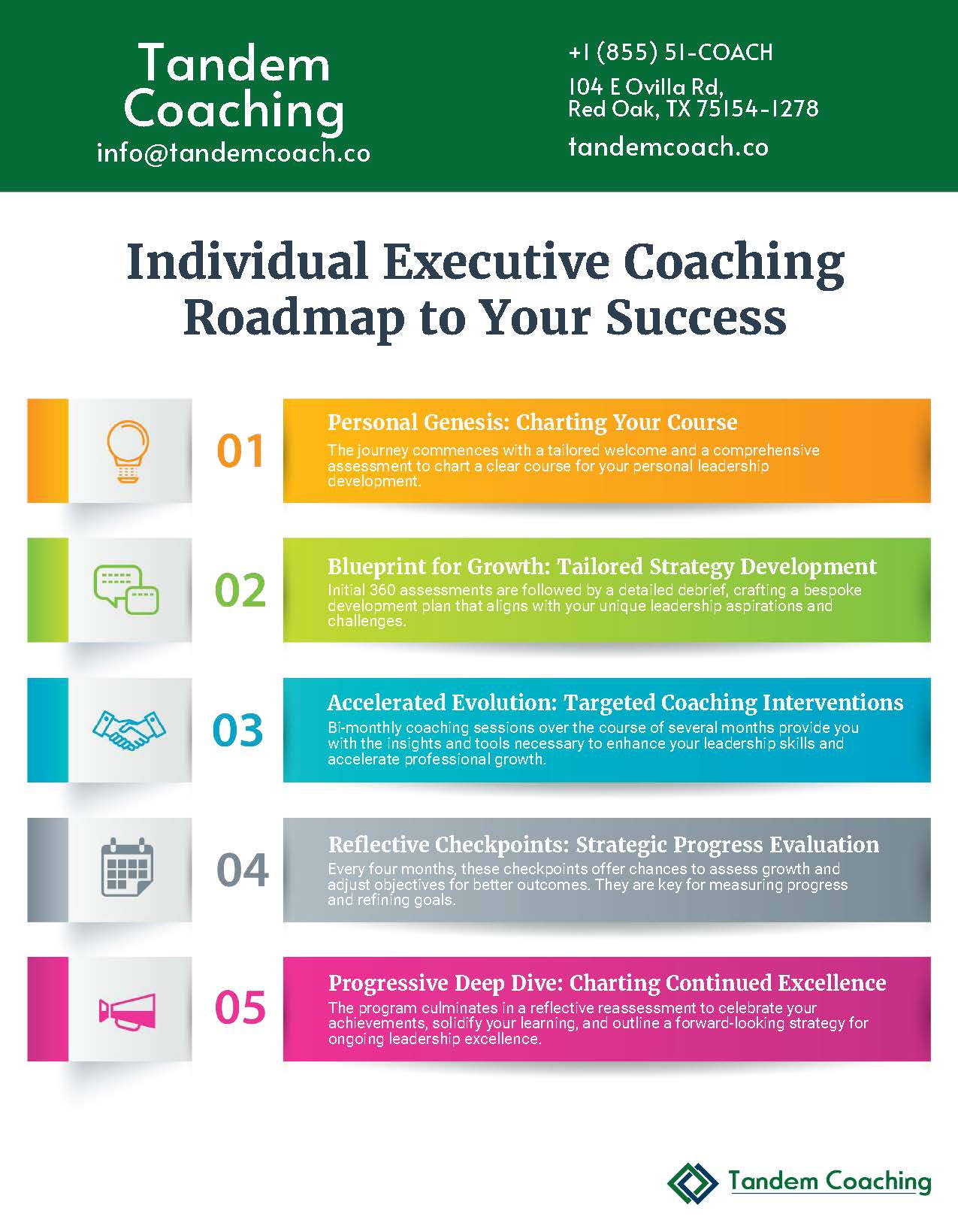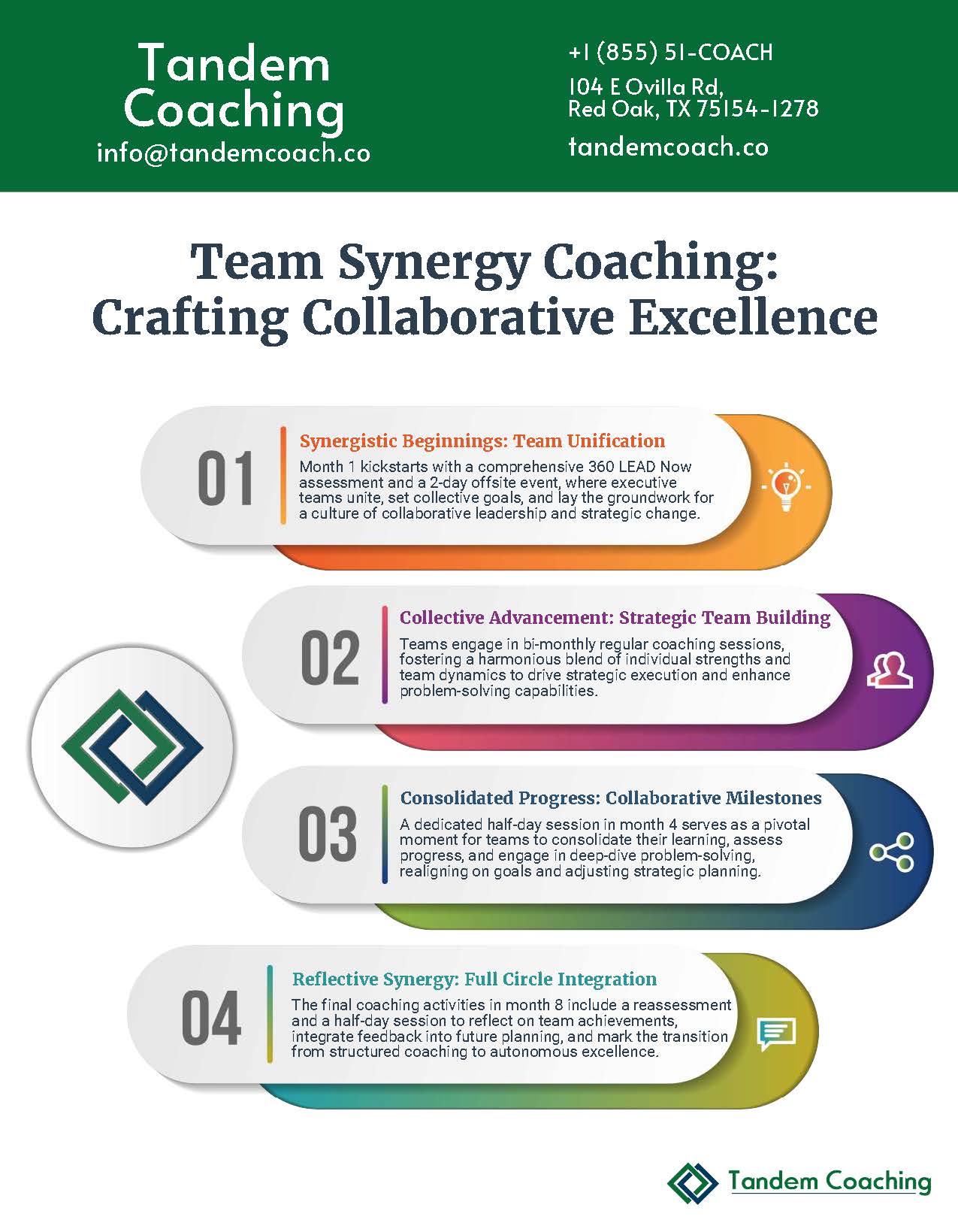Did you know that 70% of change initiatives fail? Unsurprisingly, a leading cause of this failure is the leaders’ lack of change management skills.
In this blog, we have discussed eight change management skills for leaders and how to develop and implement them.
Read on to get the full details.
TL;DR – 8 Skills for Successful Change Management
Here is a quick summary of the skills we’ve discussed in this article:
- Communication
- Leadership
- Resilience
- Strategic thinking
- Analytical thinking
- Research
- Active listening
- Adaptability
These are fundamental skills, and every leader hoping to make a successful change should aim to develop them.
Our professionals at Tandem Coaching offer executive coaching solutions to help senior leaders like yourself build the necessary skills to manage a change process effectively.
Reach out to us today for a free consultation.

What Are Change Management Skills?
These are the competencies required to effectively lead and support individuals in an organization through a period of transition.
These skills combine interpersonal and strategic abilities that facilitate the seamless incorporation of new processes, ensuring minimum resistance.
Key Benefits of Change Management Skills
Having the right skills to lead a change process comes with numerous benefits:
- Smooth transitions: The more skilled you are, the fewer disruptions the organization will encounter during a change. The entire procedure is completed in an organized manner, and productivity does not decline.
- Employee engagement: With the right skills, you can get all hands on deck during this period. This increase in commitment and participation leads to better outcomes.
- Improved leadership: Successfully handling a change process enhances your credibility and influence in an organization. Your leadership capacities increase, allowing for advancement.
- Career advancement: As a professional with change management skills, your value increases. You become more sought after, expanding your opportunities and opening bigger doors in your career.

Examples of Change Management Skills
Here are two examples showing the implementation of change management skills:
The Bounce Back of Domino’s Pizza
In 2008, Domino’s Pizza faced a declining sales problem, and customers were losing interest quickly. Fortunately, they detected the problem and quickly focused on online ordering and incorporating new technologies that could facilitate it. Shortly after implementing these changes, Domino’s improved their sales and revitalized their brand image.
Domino’s brand was saved by applying three change management skills: research, communication, and strategic planning.
Microsoft’s Turnaround
In 2010, Microsoft faced the challenge of a stagnant market. They identified the problem as a cultural problem and made a cultural shift that quickly turned things around for them and skyrocketed the brand.
They moved from a ‘know-it-all’ culture to a ‘learn-it-all’ mindset, and this involved promoting collaboration and open communication among employees.
The Microsoft brand was saved by applying three change management skills: active listening, research, and communication.

8 Most In-Demand Change Management Skills
What are the eight most in-demand change management skills?
1. Communication
Effective communication is a necessity in change management. Without clear communication, employees find it difficult to understand the reason for the change and how to establish it.
For effective communication:
- Decide on communication channels to use
- Craft clear and concise messages
- Provide regular updates
In our executive communication coaching program, we help professionals like you perfect your communication skills, making both verbal and written communication easy.
2. Leadership Skills
Strong leadership is essential for successfully leading a team through a change. As a leader, you are fully responsible for actualizing the vision.
Some of your roles include:
- Motivating employees
- Inspiring confidence among team members
- Managing resistance effectively
- Making decisions
- Creating a supportive environment for everyone to function properly.
Several leadership development tools can help you improve your leadership capacity.

3. Resilience
Resilience entails maintaining focus during challenging times. Resilient people are better equipped to thrive under conditions of stress and uncertainty, which are common feelings during organizational changes.
As a resilient leader, you help individuals cope with change and make the entire transition process smoother. You can model resilience by:
- Demonstrating adaptability
- Maintaining a positive outlook
- Encouraging open communication
- Encouraging a growth mindset
- Celebrating small wins
Organizations that have developed the skill of resilience are better positioned to navigate transition phases.
4. Strategic Thinking
With strategic thinking, you can analyze complex situations, identify goals, and craft careful steps to actualize these goals. Strategic thinking helps you develop a clear vision for change and align it with the organization’s mission and objectives.
As a strategic thinker, you can foresee and avert potential obstacles to your set plans. This skill keeps you one step ahead of challenges and makes it easier to accomplish set goals.
5. Analytical Thinking
Analytical thinking empowers you to assess risks, interpret data, identify trends, and make informed decisions.
You will need to employ analytical frameworks like SWOT to guide decision-making processes. Analytical thinking also helps you:
- Identify root causes of problems and solve them
- Facilitate effective planning
- Enhance your overall judgment and make better decisions
- Evaluate impact and outcomes

6. Research
Every great leader is an excellent researcher. Research helps you gather relevant information and use available data to make informed decisions through the change process.
Here is how research comes in handy:
- Identify needs and gaps
- Study successful change projects and adopt relevant strategies for your organization
- Make data-driven decisions
- Enhance communication strategies
- Create a culture of knowledge and curiosity
7. Active Listening
This is how active listening helps change management processes:
- Builds trust and rapport: By showing genuine interest in employees’ feedback and concerns, you make them feel seen, thus building trust and rapport.
- Uncovers resistance: When you listen carefully to employees, you can quickly identify resistance and hindrances that could be preventing them from accepting change.
- Enhances communication: When you practice active listening, you set a good example for others to follow, boosting team communication.
- Create a supportive environment: When employees know their voices are heard and matter, they feel safer and ready to accept change.
8. Adaptability
The ability to adapt to new situations is essential in a fast-paced environment where changes can occur rapidly.
As a leader, you should be flexible in your approach and always willing to make adjustments for the benefit of all parties.

How to Develop Change Management Skills
The good thing about change management skills is that they can be acquired.
Here are some ways to develop change management skills:
- Coaching: Our coaches at Tandem Coaching can help you develop these needed skills. We offer personalized coaching sessions tailored to meet your specific needs. We can work with you to identify the skills you need and craft a functional strategy for you. Reach out to us today.
- Continuous learning: As a leader, you need to stay updated in the leadership industry. Commit to gathering knowledge and experience, taking courses and getting more certifications, attending live and workshop sessions, and being open to learning.
- Seek feedback: Regularly seek feedback from your peers and team members. Be open to improvement.

How to Implement Change Management Skills in the Workplace
To implement change management in the workplace, here are some steps to follow:
- Engage employees in the process: Engaging employees actively in the change process teaches them some skills required to handle change effectively.
- Provide training and support: A good way to pass down the skills you have learned is by training the team. Provide necessary data and tools to equip them for the change.
- Foster a culture of continuous learning: Beyond initial training sessions, provide regular workshops and access to resources to encourage a culture of continuous learning among employees.
- Encourage collaboration: Encourage team members to work together on change initiatives. By providing solutions to problems, their management skills become stronger.
- Monitor progress and feedback: Regularly assess the employees throughout the change process to see what skills they have gained and how they are utilizing them. If any skills are lacking, arrange for a follow-up training session.
- Provide support structures: A change process can be tough to navigate. You can provide mentoring and coaching programs for employees to seek guidance. This support will enhance their confidence in managing transitions and help them develop more change management skills.

Frequently Asked Questions (FAQs)
Here are the answers to some frequently asked questions about change management skills.
What Are the Most Sought-After Change Management Certifications?
The top sought-after certifications in this niche are:
- Prosci Change Management Certification (PCMC)
- Certified Change Management Professional (CCMP)
- Change Management Specialist
These certifications focus on developing advanced skills and expertise, which can help you easily pioneer change management processes.
How Can You Measure the Effectiveness of Your Change Management Skills?
Here is how you can know the effectiveness of your change management skills:
- Track set KPIs: Metrics like ‘employee engagement’ and ‘productivity level’ can show effectiveness.
- Self-assessment tools: Tools like Change Management Maturity Model (CMMM) can evaluate your strengths and identify areas for improvement.
- Employ feedback mechanism: Collect feedback from employees and stakeholders using forms and surveys to gauge impact.
How Can You Use Change Management Skills in Personal Development?
As you improve your change management skills, you equally develop some personal skills, like:
- Self-awareness
- Positive mindset
- Goal setting and accomplishment
- Continuous learning
- Resilience
These skills can affect your personal life positively.
Conclusion
As you embark on the journey of change in your organization, actively developing change management competencies will empower you to successfully pull through and manage any change successfully.
Ready to build these change management skills? Book a free consultation today, and let us discuss how we can help you navigate change seamlessly.


















